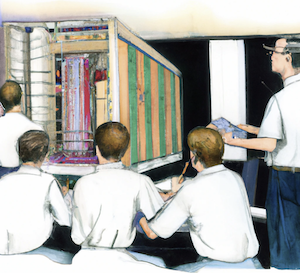Little did I know that behind his televised narratives on mysteries lay a treasure trove of books and stories, waiting to be discovered. Among them, one story, in particular, has held a special place in my heart - "The Nine Billion Names of God."
A Journey into Arthur C. Clarke's Universe
Growing up, I was introduced to Arthur C. Clarke through his television program, which delved into enigmatic phenomena and the paranormal. His eloquent narration and scientific approach made the mysteries of the universe even more captivating. At that time, I had a collection of books by him on paranormal subjects, which both fascinated and frightened me.
However, it was only later in life that I realized Clarke was not just a television personality but also a prolific writer. Among the books I kept from my childhood collection was "Of Time and Stars," a compilation of short stories by Clarke. Little did I know that within this dog-eared book lay my favorite short story of all time.
"The Nine Billion Names of God": A Cosmic Revelation
"The Nine Billion Names of God," the first story in "Of Time and Stars," is a masterpiece of science fiction that takes readers on a mind-bending journey through space and time. Set in a remote Tibetan monastery, the story follows two Western computer technicians who are hired to help the monks in a peculiar mission.
The monks believe that the universe was created for the sole purpose of discovering and writing down the nine billion names of God. They have been manually transcribing these names for centuries but believe that with the help of a computer, they can finish the task more quickly. What follows is a narrative that beautifully weaves together elements of science, religion, and existential philosophy.
The story's brilliance lies in its ability to blend scientific concepts with a profound exploration of human purpose and the search for meaning in an unfathomable universe. As the technicians work tirelessly to complete the task, they begin to question the implications of their actions and the consequences of fulfilling the monks' prophecy.
Conclusion
Arthur C. Clarke's "The Nine Billion Names of God" is a short story that has resonated with me throughout my life. It encapsulates the essence of his work—bridging the gap between science and the mystical, challenging our understanding of reality, and inviting us to ponder the mysteries of existence.
Despite my initial attraction to Clarke's work through paranormal mysteries, it is his ability to blend science fiction with deep philosophical questions that has left a lasting impression on me. "The Nine Billion Names of God" is a testament to his storytelling prowess and his profound exploration of the human condition.
In revisiting this story within the pages of my well-worn copy of "Of Time and Stars," I am reminded of the enduring power of literature to inspire wonder and provoke contemplation. Clarke's tale continues to ignite my imagination and encourages me to explore the infinite universe of possibilities that literature and science fiction have to offer.
A Journey into Arthur C. Clarke's Universe
Growing up, I was introduced to Arthur C. Clarke through his television program, which delved into enigmatic phenomena and the paranormal. His eloquent narration and scientific approach made the mysteries of the universe even more captivating. At that time, I had a collection of books by him on paranormal subjects, which both fascinated and frightened me.
However, it was only later in life that I realized Clarke was not just a television personality but also a prolific writer. Among the books I kept from my childhood collection was "Of Time and Stars," a compilation of short stories by Clarke. Little did I know that within this dog-eared book lay my favorite short story of all time.
"The Nine Billion Names of God": A Cosmic Revelation
"The Nine Billion Names of God," the first story in "Of Time and Stars," is a masterpiece of science fiction that takes readers on a mind-bending journey through space and time. Set in a remote Tibetan monastery, the story follows two Western computer technicians who are hired to help the monks in a peculiar mission.
The monks believe that the universe was created for the sole purpose of discovering and writing down the nine billion names of God. They have been manually transcribing these names for centuries but believe that with the help of a computer, they can finish the task more quickly. What follows is a narrative that beautifully weaves together elements of science, religion, and existential philosophy.
The story's brilliance lies in its ability to blend scientific concepts with a profound exploration of human purpose and the search for meaning in an unfathomable universe. As the technicians work tirelessly to complete the task, they begin to question the implications of their actions and the consequences of fulfilling the monks' prophecy.
Conclusion
Arthur C. Clarke's "The Nine Billion Names of God" is a short story that has resonated with me throughout my life. It encapsulates the essence of his work—bridging the gap between science and the mystical, challenging our understanding of reality, and inviting us to ponder the mysteries of existence.
Despite my initial attraction to Clarke's work through paranormal mysteries, it is his ability to blend science fiction with deep philosophical questions that has left a lasting impression on me. "The Nine Billion Names of God" is a testament to his storytelling prowess and his profound exploration of the human condition.
In revisiting this story within the pages of my well-worn copy of "Of Time and Stars," I am reminded of the enduring power of literature to inspire wonder and provoke contemplation. Clarke's tale continues to ignite my imagination and encourages me to explore the infinite universe of possibilities that literature and science fiction have to offer.
